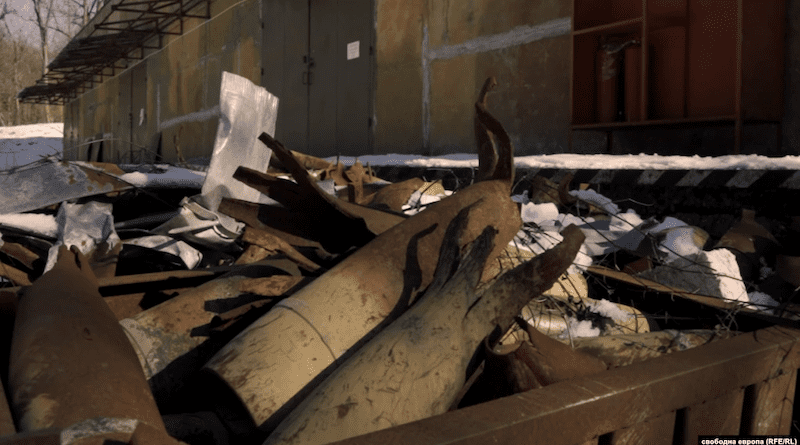Investigation Links Notorious Russian Intelligence Unit To Arms Depot Explosion In Bulgaria
By RFE RL
(RFE/RL) — An investigation has linked an explosion at a Bulgarian arms depot in 2011 to the activity of a notorious unit of Russia’s military intelligence that has been accused of involvement in other blasts and poisonings in NATO countries.
The investigation by The Insider and Bellingcat, published on October 20, describes the blast near the village of Lovnidol, 150 kilometers east of Bulgaria’s capital, Sofia, as “the first of its kind in a NATO and EU country that can be convincingly attributed” to Unit 29155 of the Russian military intelligence service (GRU).
The explosion occurred on November 12, 2011 in a weapons warehouse owned by the company EMCO.
The incident was part of a string of unexplained explosions affecting Bulgaria’s arms industry beginning more than a decade ago and seemingly intensifying after Russia invaded and occupied Crimea in 2014 in the first phase of its expanding war to subdue Ukraine, an RFE/RL investigation revealed.
Agents of Unit 29155 were linked to some of these unexplained blasts in Bulgaria and to blasts in other EU and NATO members, including the Czech Republic.
Unit 29155 is also accused of carrying out the poisoning of Sergei Skripal, a former Russian military intelligence officer and double agent, and his daughter with the nerve agent Novichok in Britain in 2018.
The Insider and Bellingcat linked Unit 29155 to the 2011 blast near Lovnidol, which destroyed more than 3,000 152-millimeter shells, by mapping the movement of alleged agents of the unit using travel data.
The shells that were destroyed in the blast were first stored in a facility in Vrbetice, a Czech village near the border with Slovakia, and were then shipped to the warehouse in Lovnidol between October 4 and November 4, 2011.
The two outlets identified several agents of Unit 29155 who visited the area of Vrbetice in October 2011. Two of them — Nikolai Ezhov and Sergei Romanov — headed to Bulgaria just days before the explosion in Lovnidol.
The outlets also identified Russian General Andrei Averyanov as the mastermind behind this and other explosions believed to have been carried out by the GRU unit by examining correspondences from hacked e-mail accounts and travel data.
The investigation links the explosion with the export of ammunition for Georgia — a country that was attacked by Russia three years earlier. The Bulgarian prosecution alleged in 2021 that the 152-millimeter shells shipped from the Czech Republic to Bulgaria had been earmarked for subsequent transfer to Georgia, although Emilian Gebrev, the owner of the company that owned the warehouse, said he had not committed the shipment specifically for export to the Caucasus country.
Gebrev was poisoned a few years later — a crime for which three members of the GRU unit were charged.
The Bulgarian prosecution’s investigation into the Lovnidol explosion discovered an explosive device, but in 2013 the prosecution suspended the probe due to an absence of evidence connecting foul play to any perpetrators.
The Bulgarian prosecution reopened the investigation in 2021 only after revelations of a similar explosion in Vrbetice came to light, and combined it with a probe of two explosions on the premises of Bulgaria’s largest armaments manufacturer, VMZ Sopot, in 2015, as well as a blast at the Arsenal weapons factory in the southern Bulgarian town of Maglizh in 2020.

